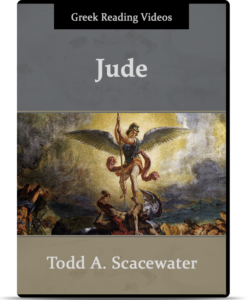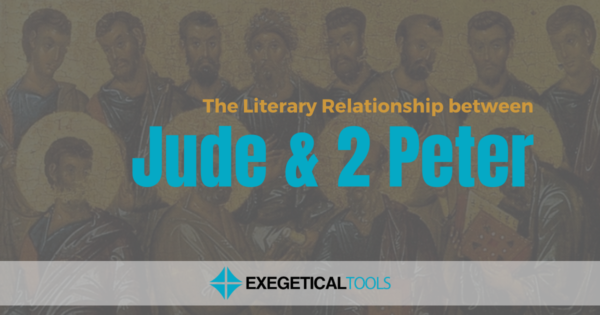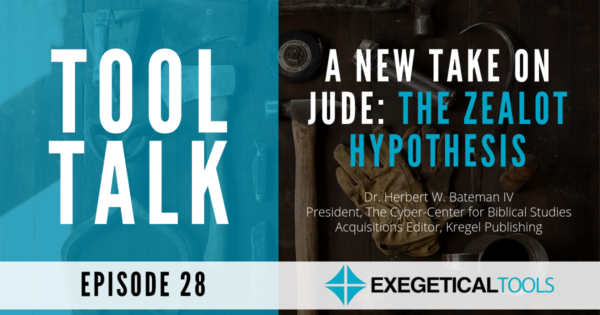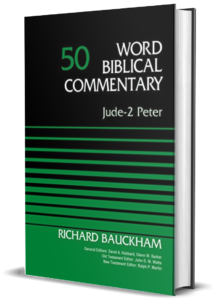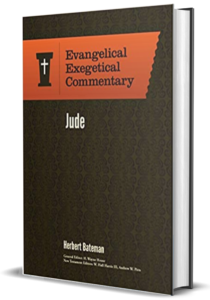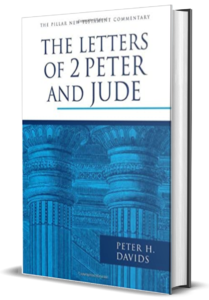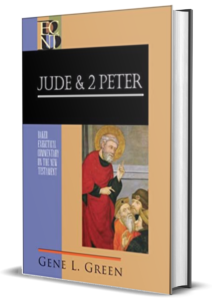The epistle of Jude is one of the shortest writings in the New Testament, but it is significant for a number of reasons. It was written by a brother of Jesus, which testifies to the monumental change in opinion his brothers had about him after his resurrection. It documents the infiltration of certain Christian communities by false teachers, who were prophesied long ago (according to Jude). The rhetoric of the Greek text is rather powerful, with triplets throughout and a consistent distancing of the "opponents" who are only referred to in the third person plural ("they/them"). The short epistle also contains one of the most eloquent and powerful blessings in the New Testament.
Exegetical Tools provides our Jude Greek Reading Videos, which walk you through the epistle in Greek one verse at a time. Additionally, below are a variety of resources to help you get further acquainted with Jude and its importance for Christian theology. If you would like to contribute to the resources on this page, contact us (see footer).
10 videos teaching through the Greek text of Jude a few verses at a time. Focusing on refreshing and solidifying morphology, syntax, and vocabulary, the viewer will regain and improve their Greek as they work through this important first century Christian epistle.
Get Access$29.95 Watch Videos
Author and Occasion
The Literary Relationship between Jude and 2 Peter
Five different theories, and in the end, what is the effect on inspiration?
A New Take on Jude: The Zealot Hypothesis | Herbert W. Bateman IV
A novel proposal that Jude was occasioned by Judean zealots recruiting for the Jewish Wars leading up to the destruction of the Temple in Jerusalem.
The Message of Jude
Themes in Jude
Jude is a short epistle that depicts the fulfillment of prophecy about false teachers and tribulation and calls for perseverance in faith, hope, & love.
Yes, Jesus Saved and Destroyed the Israelites
You wouldn’t know it from reading the Pentateuch, but, yes… Jesus did destroy the Israelites.
Where Does the Lord Rebuke Satan?
Jude claims Michael did not rebuke the devil but said “The Lord rebuke you.” But where did the Lord say this? The Greek gives it away.
The Greek Word Used for Korah’s and Israel’s Rebellions
Attention to the Greek word for Korah’s “rebellion” reveals its application also to Israel during their wilderness period.
Preaching and Teaching Jude
The Structure of Jude with Sermon Outlines
Prepare for preaching Jude with this survey of its structure followed by four sample sermon outlines with suggested main points.
Kept for Jesus Christ: A Homily based on Jude
The beauty of this verb is that we are not its subject.
Online Resources for Jude
The following resources are available online in the public domain.
Commentaries
- Charles Bigg, A Critical and Exegetical Commentary on the Epistles of St. Peter and St. Jude, International Critical Commentary (T&T Clark, 1902).
- Alfred Plummer, The General Epistle of Jude and the Revelation of John, The Expositor's New Testament (Hodder and Stroughton Ltd., 1860).
- Joseph B. Mayor, The Epistle of St. Jude and the Second Epistle of St. Peter (Macmillan and Co., 1907).
- John Calvin, Commentaries on the Catholic Epistles (Calvin Translation Society, 1855).
- M. R. James, The Second Epistle General of Peter and the General Epistle of Jude (Cambridge University Press, 1912).
Articles
- J. Daryl Charles, "The Use of Tradition-Material in the Epistle of Jude," Bulletin for Biblical Research 4 (1994): 1-14.
- J. Daryl Charles, "The Angels under Reserve in 2 Peter and Jude," Bulletin for Biblical Research 15.1 (Spring 2005): 39-48.
- Walter M. Dunnett, "The Hermeneutics of Jude and 2 Peter: The Use of Ancient Jewish Traditions," Journal of the Evangelical Theological Society 31.3 (1988): 287-292.
- Michael Haykin, "Exegesis 13: Prayer in the Spirit, Jude 20," Foundations 28 (Spring 1991): 16-19.
- Robert L. Webb, "The Eschatology of the Epistle of Jude and Its Rhetorical and Social Functions," Bulletin for Biblical Research 6 (1996): 139-151.

